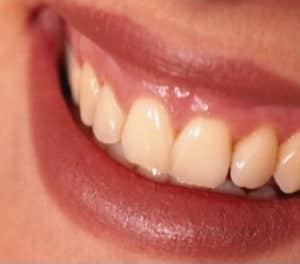
Why Are Your Gums Sore?
Irritation to your gum tissue causes sore gums. And the source of the irritation can be external—such as rough oral hygiene habits or tobacco use. Or the cause may be internal, such as a side effect of medication or a vitamin deficiency. Explore seven possible causes of gum disease.
1. Gum Disease
Gum disease is the most common cause of sore gums. Gum disease affects more than 47 percent of U.S. adults age 30 and over. And research shows that gum disease affects more men (56.4 percent) than women.
Gingivitis is a mild form of gum disease in its beginning stage. It can have these effects on your gums:
- Tenderness
- Swelling
- Recession
Untreated gingivitis progresses to periodontitis, or advanced gum disease. Periodontitis symptoms include:
- Soreness
- Swelling
- Bleeding
- Painful chewing
- Red or purple gums
- Changes in your bite
- Loose teeth
- Bad breath
2. Brushing Too Hard
A hard-bristled toothbrush or brushing your teeth and gums too hard can make your gums sore. Try brushing with a non-abrasive toothpaste and a soft-bristled manual or electric toothbrush. And go easy on your gums, applying gentle pressure.
3. Improper Flossing
Flossing usually does not hurt your teeth. But flossing too hard or too often can make your gums sore. Limit flossing to once daily. But if food gets lodged between your teeth or gums before your usual floss time, it is okay to use floss to remove it.
4. Prescription Medication
The American Dental Association article, How Medications Can Affect Your Oral Health, confirms that some medications can cause oral soft tissue reactions. The signs and symptoms may include gum irritation, swelling, and overgrowth. And if you already have dental plaque buildup, the risk of sore gums increases.
Examples of medications that can cause gum soreness:
- Nifedipine, verapamil, diltiazem, and amlodipine – Treats high blood pressure
- Cyclosporine – Suppresses the immune system to prevent organ transplant rejection
- Phenytoin – Treats and prevents seizures
Talk to your doctor if you suspect that prescription medication makes your gums sore.
5. Vitamin Deficiency
The American Dental Association emphasizes the importance of adequate nutrition and vitamins for healthy gums and teeth. When your body lacks the minerals it needs, inflammation can result. Folic acid and vitamin C deficiencies can lead to swollen gums.
Folic acid
Folic acid supports blood flow, tissue growth, and cell function. Without enough folic acid, gums can swell become sore. And your risk of gum disease will increase.
Vitamin C
Vitamin C promotes tissue growth and repair and helps your body fight infection. Without it, gums can swell and bleed more easily.
If you think a vitamin deficiency is the cause of your sore gums, talk to your doctor about it before taking supplements.
6. Hormonal Changes in Women
Hormonal changes can affect the way your body supplies blood to your gums. These factors may alter a woman’s hormones and cause sore gums:
- Birth control pills – Altered hormones can affect your body’s response to plaque.
- Menopause – When hormones decrease saliva, sensitivity to heat and cold in your mouth can increase and irritate gum tissue.
- Pregnancy – Increased progesterone can affect how your body handles tooth plaque and lead to infection and soreness.
Hormonal imbalance can be challenging to correct. Consult with your doctor.
7. Tobacco Use
The American Academy of Periodontology confirms that tobacco use is one of the highest risk factors that lead to gum disease. Chemicals in tobacco irritate gum tissue and cause soreness and swelling. Also, tobacco weakens your body’s immune system and makes it difficult to fight infection. So as bacteria builds up between your teeth and gums, your inflamed gums will be sore. Quitting the habit will make a difference.
Summary
Gum disease is the primary cause of gum soreness. But other reasons include rough oral hygiene habits, prescription medication, vitamin deficiency, hormone changes, and tobacco use. If you have ongoing gum soreness, don’t ignore it or guess what is causing it. Schedule an appointment with a gum specialist, or periodontist.
Dr. David Pumphrey, an Atlanta periodontist with more than 35 years of experience, sponsors this post.







